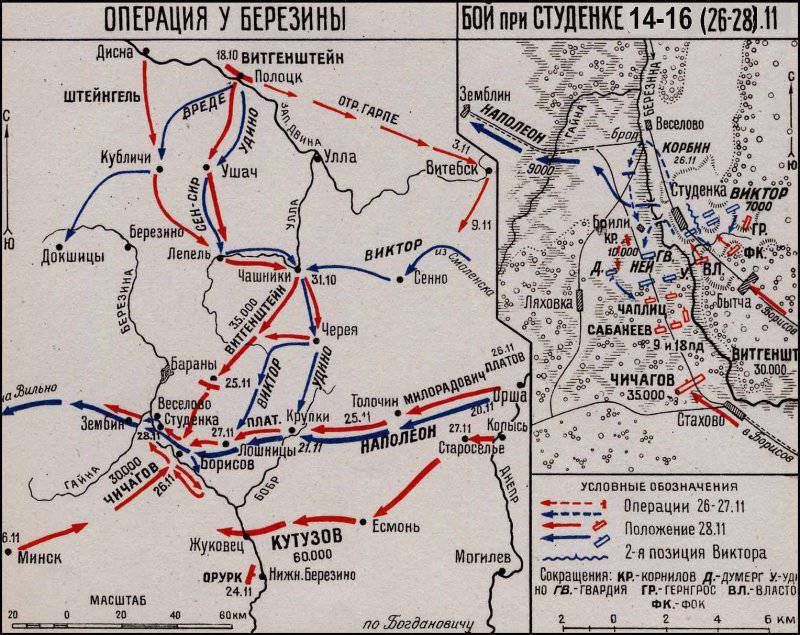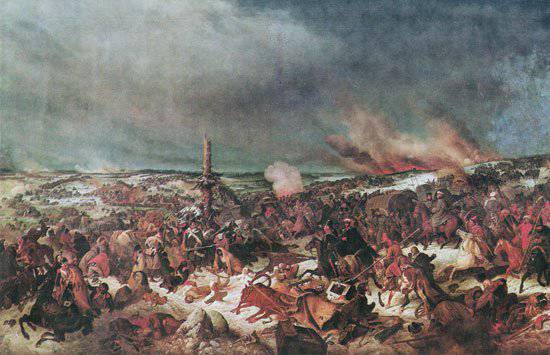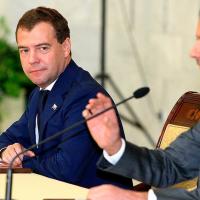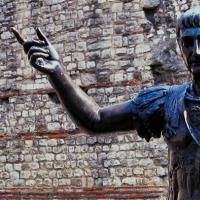Battle of the Berezina 14–17 (26–29) November 1812
The defeat of the French army near Krasnoe could become a prologue to the complete defeat of the enemy. To do this, it was necessary to implement the plan conceived by Mikhail Kutuzov to encircle enemy forces in Mesopotamia. Kutuzov carried out a similar operation in the war with Turkey, when, with weaker forces than the enemy, he stopped the advance of the Turkish army at Slobodzeya, then pressed it to the Danube, surrounded it and forced it to surrender. Now it was necessary to destroy a much more professional army than the Turks.
After the battle near Red () Kutuzov gave the troops one day of rest - November 7 (19). The troops needed to be put in order, to clear the rear from the remnants of the defeated French troops. The pursuit of the enemy was continued by Miloradovich's vanguard, Platov's Cossacks, Ozharovsky's detachment and other commanders of individual formations. For a further offensive, it was very important to establish contact with the armies of Wittgenstein and Chichagov in order to deliver coordinated strikes against the enemy. The Russian command believed that the enemy troops could go to Lithuania, or move to Volhynia, to join the Austrian-Saxon troops. A French move north to link up with Victor and Saint-Cyr was considered unlikely. Wittgenstein was ordered to increase pressure on the right flank of the retreating enemy army, and they promised him Platov and Adjutant General Kutuzov to reinforce him. The commander-in-chief also ordered Chichagov to speed up the exit to the Berezina in order to forestall Napoleon and occupy Borisov before him. Kutuzov, believed that Chichagov had already connected with the troops of Leaders and Ertel, so his army should have increased to 60 thousand soldiers. With such forces, Admiral Chichagov could well resist Napoleon's troops, who were almost without cavalry and artillery.
The information received on November 8-10 from Platov, Yermolov and Seslavin made the picture clearer. It was obvious that the enemy was continuing to move from Orsha along the high road to Borisov. Thus, Chichagov's army had to take the blow. The idea of the Russian command was to take Wittgenstein's forces from the north and Chichagov's army from the south to take a defensive position on the line of the Ulla and Berezina rivers with the front to the east and cut off the escape routes to the west for Napoleon's troops. The main army under the command of Kutuzov was supposed to strike at the French from the east.
One of the problems of the Main Army was the issue of supply. As it moved west, the army received less and less food. In order to somewhat improve the situation, it was decided to capture several French bases. One of the enemy's major food bases was located in Mogilev. The commander-in-chief gave the order to the detachments of Ozharovsky and Davydov to capture it. Ozharovsky perfectly fulfilled this order. On the way, Ozharovsky defeated an enemy detachment near the town of Gorki. In the battle, about 1.5 thousand enemy soldiers were destroyed, about 600 were captured and took 4 guns. In addition, Ozharovsky destroyed the enemy detachment in Shklov and saved the city from destruction. 10 thousand Cossacks of the Ukrainian militia joined the detachment of Ozharovsky. On November 12 (24), his detachment captured the city and proceeded to clear the south of Belarus from the enemy.
In addition, the command took steps to create food bases in Smolensk, Kyiv, to increase stocks in Bobruisk stores. No less difficult was the situation with winter uniforms. The bulk of the soldiers were still in summer uniforms. As a result, a significant number of sick soldiers left the army every day, with whom the mobile hospitals and stationary hospitals being established in the rear were clogged. Such losses exceeded combat and amounted to 30 thousand people. After the battle of Krasnoye, Kutuzov's army had no more than 50 thousand soldiers.
While the Main Army was moving south of the Moscow road, Chichagov, with the help of Lambert's vanguard, captured Minsk with a quick strike on November 4 (16), where there were significant enemy food supplies (about 2 million rations). More than 4 thousand enemy soldiers were captured in the city and its environs, mostly the wounded and sick. On November 9 (21), Lambert's vanguard, after a fierce battle, defeated the superior enemy forces and captured the crossing from Borisov (). The remaining enemy forces under the command of Dombrovsky were forced to retreat and moved towards Napoleon. Behind Lambert's vanguard, Chichagov's main forces approached Borisov and established themselves in this position. At the same time, detachments of Chaplits and Lukovkin arrived. Chaplits went out to Zembin, and Lukovkin to the Shabashevichs. Chichagov began to transport troops to the left bank of the Berezina. Moreover, instead of first transporting the cavalry and infantry, he began to transfer artillery and carts, although already on November 9 it was known that the French should be expected in 2-3 days.
In Borisov, Chichagov also received a message from Wittgenstein that his troops were pushing back units of Oudinot and Victor, who, in his opinion, were retreating through Loshnitsy south to Lower Berezino. Chichagov sent 3 thousand vanguards under the command of Palen to Loshnitsy (Lambert was seriously wounded and was sent for treatment) in order to establish contact with Wittgenstein's troops. Palen's detachment, moving along the Smolensk road without proper security measures, at Loshnitsy ran into 10 thousand vanguard of Napoleon's army under the command of Oudinot. The road along which Palen walked passed through a dense forest, which excluded the possibility of deploying troops. Directly at Loshnitsy, the road left the forest and passed through a small copse. Oudinot, having received information about the movement of Russian troops, deployed his corps in this very copse. Across the road, he placed artillery with infantry, behind the cavalry. When the Russian column left the forest, it was met by the fire of the French cavalry. Taking advantage of the confusion of the Russians and the fact that they could not deploy troops, pushing artillery, Oudinot went on the attack. The Russian infantry was driven into the forest, and the cavalry was overturned. The Russians, pursued by the French cavalry, retreated to Borisov. The French appeared at Borisov almost simultaneously with the retreating Russian troops.
The appearance of the French near the city was sudden for Chichagov. He assumed that these were the main forces of Napoleon and did not dare to start a fight. The admiral overestimated the power of Napoleon's army, believing that he had at least 90 thousand combat-ready soldiers. Instead of delaying the enemy with the available forces until the rest of the troops crossed to the right bank of the Berezina, he decided to clear Borisov. In the city, they had to abandon part of the carts already transported and blow up the bridge across the river. On November 12 (24), Admiral Chichagov, having overestimated the strength of the enemy, withdrew his troops (about 25 thousand soldiers) from Borisov and retreated to the right bank of the Berezina from Zembin to Usha. The capture of Borisov allowed Napoleon to be the master of the left bank and choose a place for the crossing. In addition, Chichagov was forced to disperse his forces in order to monitor the forces of the enemy.
Wittgenstein acted no better than Chichagov. At first, he assumed that Napoleon would go to connect with the corps of Victor and Oudinot, who occupied Cherei. However, news soon came that the French troops had left to join Napoleon. The actions of the French confirmed Wittgenstein's idea that the French would try to cross south of Borisov. He reported this in a letter to Chichagov. Wittgenstein did not know that Victor's troops retreated against the orders of Napoleon, who demanded to hold positions and create the appearance of the advance of the entire French army to the northwest. Having established the fact of the withdrawal of the French troops, Wittgenstein began to slowly move after them.
Actions of Napoleon
After the defeat at Krasny, Napoleon had to solve two main tasks. First, to make every effort to preserve the main cadres of the troops, who retreated to the west under the constant attacks of Russian regular units and partisan detachments. Secondly, he faced the most difficult task of saving troops from the simultaneous attack of three Russian armies, which together numbered about 100 thousand people.
While in Orsha, the French emperor reorganized Davout's 1st corps into three battalions, Ney's 3rd corps was also reduced to three battalions, Beauharnais's 4th corps and Junot's 8th corps were reduced to two battalions each. Napoleon even ordered the banners of all the corps to be collected and burned. The remaining artillery was also reorganized. 30 guns from the 9th Corps of Victor arrived in Orsha, in addition, there was already a fleet of 36 guns in the city itself. Of these, 6 batteries were formed and reinforced with them the corps of Ney, Davout and Beauharnais. The troops received the necessary ammunition and food from warehouses in Orsha and Dubrovna. From the remaining cavalry, a detachment of 500 officers was formed, Napoleon called it "his sacred squadron." These measures increased the combat capability of the army. With the arrival of the corps of Victor and Oudinot, the size of the army increased to about 75 thousand people, while the total number with the stragglers and sick soldiers who trailed behind the corps was about 85-90 thousand people. The combat-ready core of the army was approximately 40 thousand soldiers.
In Orsha, Napoleon received a message that Victor's corps was unable to complete the task - he had to push Wittgenstein's army beyond the Western Dvina. A message was also received about the capture of Minsk by Chichagov's troops. The emperor, worried, orders Oudinot to immediately go to Borisov in order to forestall the Russians. Corps Victor had to play the role of the flank vanguard, he had to convince Wittgenstein that Napoleon's army would retreat north of Borisov. After the withdrawal of the main forces from Orsha, Victor's corps began to play the role of a rearguard.
On November 9 (21), French troops left Orsha and destroyed all crossings across the Dnieper. On November 10 (22), the French arrived in Tolochin. Here a message was received about the capture of Borisov by Chichagov. This news aroused Napoleon's anxiety, and he convened a council of war. The question was raised about the further actions of the army. It was proposed to turn north, push Wittgenstein beyond the Dvina, and go through Glubokoe to Vilna. Jomini believed that it was possible to go to Borisov, cross the Berezina and break through to Vilna. At this time, a report was received by Oudinot about the discovery of a ford near the village of Studenki. This finally determined Napoleon's decision to cross at Borisov.
Napoleon's army marched to Borisov for three days. Oudinot was the first to enter the city, followed by the guards. Here Napoleon stood for two days in indecision. Oudinot took the Russian units passing along the right bank, knocked out of Borisov and crossing the Berezina at Veselov, for Wittgenstein's vanguard. When the French headquarters became convinced that this assumption was erroneous, energetic preparations for the crossing began. To distract Chichagov's attention, they began to prepare a false crossing at the Lower Berezino, where several thousand soldiers were supposed to carry out demonstrative actions. A real crossing was prepared near the village of Studenka, 15 km from Borisov upstream of the Berezina.
The deception succeeded, Chichagov, just as Wittgenstein was misled. The admiral suggested that Napoleon wanted to break through towards Minsk in order to join the Austro-Saxon troops. Chichagov, contrary to the advice of the chief of staff Sabaneev and the corps commanders, ordered the troops to be concentrated near the Lower Berezino. At Borisov, the Lanzheron corps was left, and at the village of Bryli, the Chaplit detachment. In addition, Lanzheron considered that the enemy was trying to restore the crossing in Borisov and ordered Chaplits to leave only an observation detachment at Zembin, and the rest of the forces to go to him. As a result, the place where the French decided to cross was covered by a detachment of General Kornilov consisting of one battalion of rangers and two regiments of Cossacks with four guns.
Napoleon, having established the fact of the movement of the main forces of the Russian army south of Borisov, ordered an immediate crossing across the Berezina near Studenka. Work began on November 14 (26) under the command of engineering generals J. Eble and F. Chasselu. One bridge was intended for infantry, the other for cavalry, artillery and baggage. The sappers had to direct the crossing in icy water. According to eyewitnesses, almost all of them later died from the cold. On the same day, the corps commanders received an order to pull the troops to the crossings.
General Kornilov, having discovered the accumulation of French troops near Studenka, opened fire on them from his guns. At the same time, he sent Chaplits the news about the preparation of the crossing. However, Lanzheron detained Chaplits in Borisov. They both assumed that Napoleon, having crossed the Berezina, would go not to Vilna, but to Minsk. Kornilov could not interfere with the construction of the crossing. The Russian battery was soon suppressed by the fire of 40 guns, which were installed on the high bank of the Berezina. Under the protection of artillery, the Corbino cavalry brigade crossed, followed by a rifle battalion from Dombrovsky's division on rafts. These forces were enough to push back the Kornilov detachment. When the bridges were ready, Dombrovsky's cavalry, Dumerk's cavalry division, Oudinot's 2nd Corps, crossed the river. These forces covered the approaches to the crossing and took possession of the Zembinsky defile, where the bridges over the swamps remained intact. If Chaplits and Lnzheron had destroyed these bridges, the French would have lost time. When Chaplits approached the crossing point, he met superior enemy forces, who pushed him back beyond the village of Stakhovo. He sent an urgent report to Langeron. The latter sent only two regiments to help, as he was afraid to leave Borisov, where there were still many French troops.
At this time, on the left bank, Wittgenstein still believed that Napoleon's troops were advancing south of Borisov. Only on the evening of November 14 (26) did Wittgenstein decide to move forward and establish contact with Chichagov. It was obvious that if Wittgenstein had taken measures for deeper reconnaissance, he would have discovered the enemy's crossing and could take Studenki to prevent the enemy from retreating. However, he also overestimated the strength of the enemy and did not want to take a hit on his army. The forces of Wittgenstein's army (35-40 thousand people) were quite enough to withstand the onslaught of the enemy for two days, thereby enabling Chichagov to reach the threatened area and approach Kutuzov's army.
At this time, Chichagov received news that the crossing at the Lower Berezino was false, and the real one was located at Studenka. Soon Langeron also received a message about the actions of the enemy. The admiral realized that he had been cruelly deceived by the enemy and immediately set out. On November 15 (27), having covered more than 30 versts in a day, Chichagov's army again reached Borisov. The troops were exhausted by the march, and they had to rest, only part of the cavalry was sent to Studenka. As a result, on November 15 (27), the French crossed quite calmly. On this day, the guards, the 1st and 4th corps of Davout and Beauharnais crossed the river. As a result, Napoleon already had 14-15 thousand combat-ready soldiers on the right bank of the river. Oudinot's 2nd Corps defended the crossing site, while Victor's 9th Corps held Borisov. By the night of November 27, on November 27, stragglers began to arrive, crowds of abandoned, sick and wounded soldiers, civilians with convoys. Napoleon Bonaparte ordered only combat-ready, "walking in the ranks" groups to pass through, the wagons were not allowed to pass.
Wittgenstein only at the end of the day on November 15 decided to put forward the vanguard to Old Borisov, and with the main forces to go to the new Borisov. The vanguard under the command of Major General Vlastov, having reached the edge of the forest, through which the road from Stary Borisov to Studenka ran, discovered the French and began the battle. It was the division of General Partuno, which had the task of holding Borisov until the crossing was completed. But Partuno left the city earlier due to the appearance of the forces of Platov and Yermolov. There were about 7 thousand people under the command of the French general. Partuno attacked the Russian troops at dusk, but was repulsed with heavy losses. Seeing that he was surrounded, Partuno sent an officer to Wittgenstein to negotiate surrender, and he himself, with part of the division, tried to make his way through the forest to the crossing, but was unsuccessful and was captured. On the morning of November 16, the rest of the French laid down their arms. It was only after this that Wittgenstein realized his mistake and decided to attack the French army.
The main army at this time was preparing for battle. Ordering Chichagov and Wittgenstein to block the escape routes to the west and north, Kutuzov wanted to force the enemy to move south, where the main forces of the Russian army were waiting for her. November 15 (27) The main army was stopped to rest, preparing for the decisive battle.

On the morning of November 16, Napoleon still held both banks of the Berezina behind him. He wanted to transfer the wagon train and Victor's corps. He did not yet know about the surrender of the Partuno division and believed that Victor had two divisions. About 20 thousand people crossed to the right bank, about the same number remained on the other bank.
At about 10 o'clock in the morning, Wittgenstein, with the forces of Vlastov, attacked and brought down artillery fire on the masses of people who had accumulated at the crossing. Victor went on a counterattack, but his blow was not successful. Following Vlastov's vanguard, Berg's infantry division and Fok's reserve entered the battle. The stubborn battle continued until nightfall. Artillery shelling caused panic in the retreating crowd, a stampede began, people rushed to the crossings. One of the bridges collapsed.
Chichagov's troops that day also went to the crossing and, having heard artillery fire at Studenka, also went on the offensive. The blow was taken by Oudinot's body. The troops of the Sabaneev Corps during the second attack almost completely killed the Vistula Legion. Other parts of the French corps also suffered heavy losses. Napoleon sent the troops of Ney's corps, the Old and New Guards to help Oudinot. Oudinot himself was wounded and replaced by Ney. The terrain was swampy, which made it difficult for the cavalry, so the Russian troops could only push the French. Soon Sabaneev was forced to stop the attacks and move on to artillery shelling. The fierceness of the battle on this day is evidenced by the number of wounded and killed French generals in three corps - 17 people.
Platov's corps, having occupied Borisov on the evening of November 15 (27), on the morning of November 16, crossed to the right bank of the river and moved around to the Zembinsky defile.
On November 17, Napoleon realized that artillery and carts could not be saved, and ordered Victor to leave the left bank. The troops of this corps cleared their way, throwing people off the bridge and began to cross to the other side. After part of the troops crossed over to the other side, the emperor ordered General Ebla to burn the crossing. Napoleon feared that the Russian infantry would also break through behind Victor's corps. Several thousand still combat-ready soldiers and huge crowds of lagging behind incompetent French soldiers were thrown. They were thrown to save those who managed to cross. Most of the abandoned drowned, trying to cross, or were taken prisoner, some were hacked to death by the Cossacks.
Napoleon led only 9 thousand combat-ready soldiers to the Zembinsky defile (almost half of them were guardsmen), they were followed by crowds that had lost their combat effectiveness. The French crossed the swamps and destroyed the bridges behind them. Russian troops crossed the swamp a little later, when the intensified frosts bound them with ice.

P. Hess. Crossing the Berezina. 1840s
Results
The total losses of the French army for November 14–17 (26–29) reached 50 thousand soldiers (according to other sources, 35 thousand people). Moreover, approximately 20 thousand were lost from among the combat-ready part of the army, during the battles with the forces of Wittgenstein and Chichagov. Only the Russians captured 5 generals, 427 headquarters and chief officers, about 23.5 thousand soldiers as prisoners. The actual "Great Army" of Napoleon ceased to exist. The crossing of the Berezina and the accompanying battles were a disaster for the French army. The Russian army lost 6-8 thousand people during this time.
Napoleon managed to avoid encirclement and complete defeat on the Berezina River, which could lead to the surrender of the remnants of the army along with the emperor. Napoleon was able to break through to Vilna. The color of the generals, most of the officer corps and the imperial guard were preserved. As a result, Napoleon retained the backbone of the army, which he could build up using the troops stationed in Europe, conducting a new mobilization in France.
Napoleon managed to break through more because of the mistakes of Chichagov and Wittgenstein, and not because of his skill. A combination of circumstances and a series of mistakes by Russian generals saved the French emperor. More active and decisive actions of the armies of Chichagov and Wittgenstein could lead to a more brilliant victory. On the other hand, there is an opinion that this was the best outcome for this fight. By forcing Napoleon to give a decisive and possibly last battle, the Russian armies would have suffered huge losses. And as a result of the battle at the Berezina, Napoleon's "big army" actually ceased to exist anyway. Kutuzov saved the soldiers, having solved the strategic task of eliminating the enemy army, with minimal losses.
ctrl Enter
Noticed osh s bku Highlight text and click Ctrl+Enter


